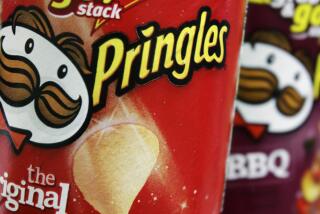COLUMN ONE : A Sweet and Nutty Craze Hits Russia : The Snickers bar has inspired children, pundits, even thieves. Others decry it as a Western invader.
- Share via
MOSCOW — Heard the latest knee-slapper making the rounds of Russian elementary schools?
Question: What happened to Snickers when it came to Russia?
Answer: It lost weight.
To get the joke, you have to know the advertising slogan that has saturated the Russian airwaves--that Snickers is covered with “a fat, fat layer of chocolate.”
Kids know the commercial. So do adults. They know the jingle so well that quips about fat, fat layers of chocolate have started to turn up in would-be witty headlines and even in speeches in Parliament.
“Snickers is becoming a kind of a symbol,” said Dmitri Ivliyev, consumer affairs reporter for the daily Izvestia. “Not only of Western life--I’d call it a symbol of our new times.”
In the new Russia that President Clinton visited last week, some of the Western firms that slavered over potential Soviet sales as the Iron Curtain came down are beginning to make major inroads across the Russian expanse--and into the Russian consciousness.
Snickers and its Mars Inc. cousins--Bounty, Mars bars, Twix and Milky Way--appear to have penetrated the Russian market far beyond any other American consumer product. Hawked by the most extensive advertising campaign here since the demise of Communist propaganda, they are turning up across the heartland, from the Altai region in the southeast to Bryansk in the west.
*
Freezer wagons selling ice-cream versions of the Mars treats stand on corner after corner along St. Petersburg’s central Nevsky Prospekt. Moscow schools in wealthier districts are strewn with the wrappers on days the cafeteria stocks the candies.
Demand is so high that chocolate thieves recently hijacked a Mars truck in central Moscow, grabbing tons of Mars and Snickers bars worth about $39,000. Teen-agers have been overheard computing prices in Snickers--”That would cost three Snickers!”--and Russians near the Chinese border reportedly consider the ability to buy two Snickers bars per week a sign that a person has solidly reached the middle class.
The candy bars have become so widespread that cultural critic Artemy Troitsky named them in his 1993 list of the top 10 Russian “objects of the year” for the daily Moscow Times, among other booming new trendy objects including handguns, currency exchange booths, casinos and telephones equipped so callers can be identified.
In the old Soviet Union, Russians could buy a taste of America mainly through Marlboro cigarettes, which were sold only for dollars and so highly valued that a pack could be used as virtual currency with cabbies and officials. Marlboro remains strong, as do Levi’s jeans and Wrigley’s gum.
But it is the humble Snickers bar, selling at 50 cents each or so, that has conquered the new Russians, who cast off communism in hopes of living like Americans. They may not be able yet to afford the big cars and houses, but the junk food, at least, is already within reach.
The Snickers success story is even more surprising here, considering that Russians already have plenty to tempt their notorious sweet tooth. They consume all kinds of more traditional cakes, ice cream and candies, including their own snack bars, which tend to feature darker, more bitter chocolate.
*
But Mars has found a distinctly American way to create a voracious appetite for its products through the kind of powerful, mercilessly repetitive advertising that has been pervasive in the United States for decades and is only now beginning here.
Starting in 1992 with billboards that irritated many consumers by advertising Mars products even before they were available in most stores, the campaign moved on last year to a television blitz the likes of which Russians had never seen. One Russian retail trade specialist said it seemed to him that not one television hour went by without a Mars commercial.
Svetlana Bubnova, saleswoman at a kiosk on Moscow’s central Garden Ring Road, said she recently watched her 4-year-old daughter recite the lines of a Mars bars ad in sync with the television and thought with despair: “This is incredible! If this continues, children will soon know Mars and Snickers better than the multiplication table.”
With its near-universal name recognition, Snickers is also becoming a lightning rod for Russian sentiment focused against the West, against the difficulties of the new era. The hard-line Moskovskaya Pravda recently ran an editorial lambasting President Boris N. Yeltsin’s reformers for claiming to care about the country while in fact, it said, they were more concerned about taking foreign trips and building themselves luxurious houses.
“They flooded the country with chocolate bars,” it said as an example of ill-considered ideas, “and now when you ask schoolchildren to name the planets, they quickly answer, ‘Mars. Snickers. . . ‘ “
*
Another newspaper ran a cartoon that depicted a poster proclaiming Snickers the best antidote to hunger--with an emaciated man clearly dead of starvation lying beneath it.
This anti-Western sentiment may contribute to Mars officials’ total refusal to talk about the company’s Russian success and controversy. Masterfoods, the Mars arm in Russia, refused to comment even briefly on how it has managed to spread its distribution network across Russia’s breadth where many others have failed.
A spokesman said it was too “commercially sensitive” and he would be “disappointed” if Masterfoods were even mentioned in this story. The Mars headquarters in McLean, Va., was equally closemouthed, in keeping with its reputation for extreme secrecy. Industry sources have long joked that the nearby Langley, Va.-based CIA houses only the second-most secretive bunch in northern Virginia.
A Russian expert on retail trade said that Mars might be especially reluctant to talk, in part, because it was badly burned by a phony story in the Russian media about a poisoned Snickers bar that allegedly killed a little girl in Voronezh, about 300 miles south of Moscow. The story ran in a local newspaper and was picked up by national television, he said, in what he believed to be a sign that the battle for the Russian chocolate market was growing so nasty that a competitor tried to sabotage Snickers to cut its early lead.
Although the Mars products’ distribution was indeed impressive, he said, the company was apparently plagued by difficulties in getting candy bars out of Moscow, where they are warehoused. He said dealers who are supposed to truck the candy to the provinces often fail to fulfill their agreements and try to sell the bars in the city instead, at higher profit, keeping the Moscow market glutted.
Ultimately, he added, the Mars dealer network is strong--but the real key to the candy’s success has been the nonstop advertising.
Executives at the Moscow branch of the New York-based firm of D’Arcy Masius Benton & Bowles said they are convinced their Mars campaign is the stuff of advertising legend. “It will be an interesting case history, what happened here,” said Sergey Koptev, DMB&B;’s managing director in Moscow. “In 1990, it happened that one country, relatively developed, was a clean sheet of paper (for advertisers). What to do? How to approach it?”
DMB&B; developed a theory that Russian consumers, who had lived so long among widespread shortages that they had no experience choosing among products, could not be approached like their Western counterparts. Koptev said DMB&B; decided it would seek to make its brands “a golden standard” and virtually create a market where only the potential existed before.
It helped, Koptev said, that Mars made a serious commitment to the Russian market and was willing to invest heavily to help advertising reach “critical mass.”
*
He would not disclose how much Mars spent on advertising but did say that DMB&B;, which has two major clients in Moscow, Mars and Procter & Gamble, did $18 million in billing for its services in 1993.
Snickers’ success has been helped along by general economic changes in Russia. The dollar exchange rate held stable for months before rising sharply in recent days, while ruble inflation continued to climb, so imported goods bought for dollars have become much cheaper in comparison to Russian goods.
Although the average Russian salary is less than $100 a month, Koptev insisted that candy bars are not out-of-reach luxuries for the average family. “People can afford it--even if they don’t have a median income but an average income. Maybe not every day but twice a week,” he said.
Whether Snickers will remain affordable depends in large part on whether the Russian government decides to heed the calls from domestic industry to impose tariffs on imported consumer goods. The government has been considering such tariffs, particularly on cars, but not out of the anti-Western sentiment that Snickers and its ilk sometimes provoke.
*
Instead, the tariffs would stem from what Russian economic guru Yegor T. Gaidar sees as a great success--that imported goods have become so cheap they are creating competition for monopolistic Russian producers.
When the tariff hike looked likely in December, the Rossiyskaya Gazeta newspaper reported on it with a headline reading, “Goodby Snickers and Your Fat, Fat Layer of Chocolate.” Word was that food, which was duty-free, would be subject to a 20% tariff.
The tariff increase now appears unlikely. The newspaper Commersant noted that “despite the strong pressure of factory lobbyists, it seems the government decided to consider the interests of all consumers . . . more important.”
The threat of tariffs may have receded, but Snickers faces a bigger menace--from competitors, including Cadbury and Nestle. They are already hustling their own sweets on the airwaves and in the stores, taking advantage of the market Mars created.
There are, however, no Cadbury or Nestle jokes yet, while the Mars repertoire is turning into a rich collection.
There is even an off-color joke, hinging on the slogan that the coconut-filled Bounty bar offers “heavenly enjoyment.”
In a locker-room mood, the macho Snickers bar asks the Mars bar whether it has sampled the lovely Bounty’s favors. When Mars says no, Snickers shakes its head and, using the oft-repeated catch phrase, says: “Too bad. She’s heavenly enjoyment.”
More to Read
Inside the business of entertainment
The Wide Shot brings you news, analysis and insights on everything from streaming wars to production — and what it all means for the future.
You may occasionally receive promotional content from the Los Angeles Times.










